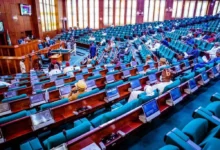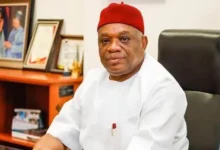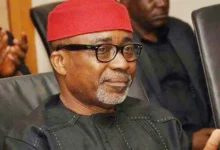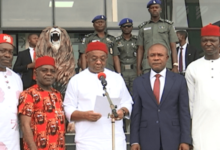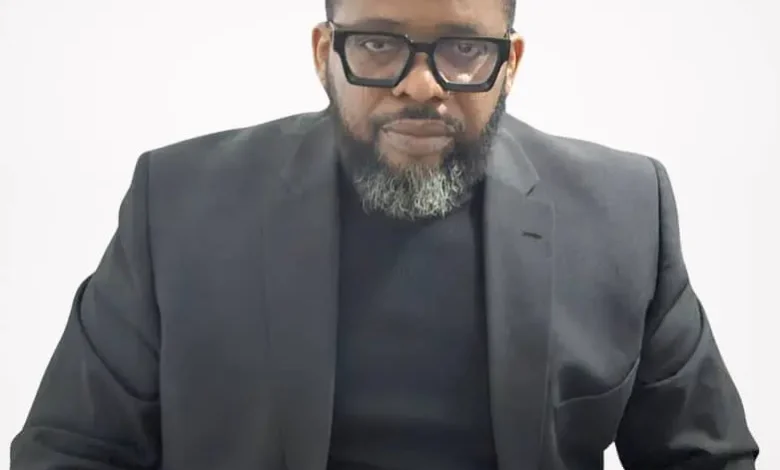
Biafra Nationalist Movement: Southeast is underrepresented in the National Assembly
Owerri: Taking into account the number of states in each region, the Igbo Biafra Nationalist Movements declared on Thursday that the Southeast was underrepresented in the National Assembly.

This was said to Vanguard by Mazi Uche Mefor, the convener of the Igbo-Biafra Nationalist Movements, during his speech on the Southeast Marginalization of state building.
The Indigenous People of Igbo Nation for Self-Determination and the Igbo-Biafra Nationalists Mazi Mefor said: “North West – 7 states, North East – 6 states, North Central – 6 states, South West – 6 states, South South – 6 states.” Southeast: five states. The Federal Republic of Nigeria’s Constitution governs the distribution of senators across the country’s geopolitical zones.
Every state has three senators in the National Assembly, as per the 1999 Constitution (as modified). As a result, the number of states that make up each geopolitical zone determines how many senators Nigeria assigns to it. Based on the statistical data presented above, Nigeria’s senators are distributed among its geopolitical zones as follows:
“North West: 21 Senators (3 senators in each of the seven states) 18 senators from the North East (6 states, with 3 senators each) Six states, with three senators each, make up North Central’s 18 senators. 18 senators from the South West (6 states, with 3 senators each) 18 senators from the South South (6 states, with 3 senators each) 15 senators from the South East (5 states, with 3 senators each) FCT—also known as the North—1 Senator
The South-East geopolitical zone contains the fewest states, which leads to the fewest senators in the Nigerian National Assembly, according to the aforementioned data. There are fifteen senators representing the five states that make up the South-East region. In comparison, the remaining geopolitical zones have a greater number of states, which means that each has a bigger number of senators (18).
“In this perspective, the South-East geopolitical zone in Nigeria is “losing” senatorial representation in comparison to the other geopolitical zones. This scenario demonstrates how the number of states in each zone affects how senators are distributed in the National Assembly. The following are the geopolitical zones and the number of members of the House of Representatives assigned to each zone:
“There are 92 members in the North West, 43 in the North East, 49 in the North Central, 71 in the South West, 61 in the South South, 43 in the South East, and 2 in the FCT (also known as the North).” With just 43 MPs each, the South-East and North-East areas clearly have equal representation in the House of Representatives based on the statistical data supplied. Additionally, the South-East continues to be at a disadvantage because it has three senators and is therefore underrepresented, whereas the North-East, with 43 representatives, still has 18 senators.
Similar to the International Court of Justice’s Walls ruling, Israel has a twofold responsibility (positive and negative) to support Palestinian self-determination and desist from obstructing their exercise of that right. Nigeria is also obligated to ensure that no segment of its populace is prevented from exercising their right to internal self-determination through physical, administrative, or legal means.
The South-East is only allowed to have five states, while other regions or zones have at least six states. This is a deliberate and willful state-sponsored apartheid policy that violates international law and even the African Charter on Human and Peoples’ Rights (with reference to CAP 10 Laws of Federal Republic of Nigeria 2004 as amended). Nigeria is seen by South-Easters as a neo-colonialist state that is determined to stifle the region’s advancement and development on the political and economic fronts.
Furthermore, the South-East zone or region is officially demoted to a permanent minority status when compared to other zones due to the lowest revenue allocation, lowest number of senators and house of representatives members, lowest number of local government areas, and underrepresentation in appointments in important sectors of Nigeria’s political and economic life. As a direct result of this, the Igbo people, who are actually one of the major ethnic groups in Nigeria, live as permanent minorities and are treated as second-class citizens alongside other Nigerians. Mefor declared, “These acts are unlawful, discriminatory, and in violation of federal character requirements, state equality, and the equal rights principle.”






